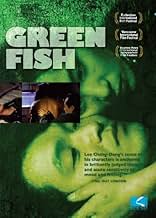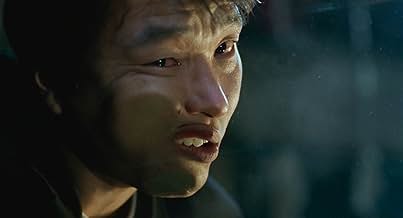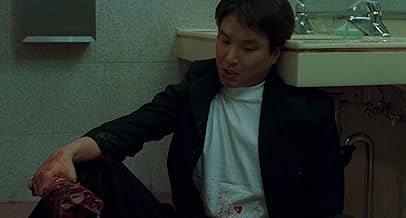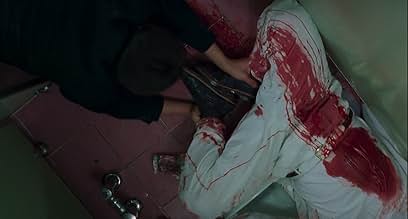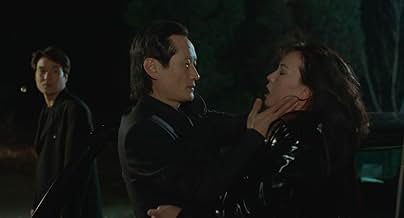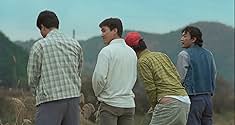IMDb RATING
7.0/10
2.5K
YOUR RATING
Returning home and finding his town drastically changed, a former soldier falls in with gangsters.Returning home and finding his town drastically changed, a former soldier falls in with gangsters.Returning home and finding his town drastically changed, a former soldier falls in with gangsters.
- Awards
- 20 wins & 7 nominations total
Kim Dong-gon
- Sandwich Man
- (as Dong-gon Kim)
Lee Ho Sung
- Elder brother
- (as Ho-Sung Lee)
Park Hye-Sook
- 3rd Brother's wife
- (as Hye-sook Park)
- Director
- Writer
- All cast & crew
- Production, box office & more at IMDbPro
Featured reviews
I purchased this movie after reading some of the very positive reviews found on this site but what a disappointment it was. It is not that the film is terribly bad, it's simply one of the many stories focused on innocent people entering the gangster world and their struggle to remain true to themselves and what they stand for in life.
GREEN FISH, just simply is not very unique or particularly moving. Yes, there are a few subplots and themes that make you want to follow the story and promise it to be an interesting one, but somehow, I feel the narrative does not gather the strength that it could have achieved to make it a remarkable story. At this stage and age it is very difficult to exploit the exploited, and a simple change of setting does not work miracles. If there is something that works well for the film, it must be the character insight, however, this does not make up for all of its weaknesses. In all, not a bad movie but I would not really recommend it as enthusiastically as others have done. Korean cinema has much higher quality representatives than this one.
GREEN FISH, just simply is not very unique or particularly moving. Yes, there are a few subplots and themes that make you want to follow the story and promise it to be an interesting one, but somehow, I feel the narrative does not gather the strength that it could have achieved to make it a remarkable story. At this stage and age it is very difficult to exploit the exploited, and a simple change of setting does not work miracles. If there is something that works well for the film, it must be the character insight, however, this does not make up for all of its weaknesses. In all, not a bad movie but I would not really recommend it as enthusiastically as others have done. Korean cinema has much higher quality representatives than this one.
Lee Chang-dong's debut film reflects a changing Korea, one where apartment high rises have sprung up in the outskirts of Seoul while a young man has been away for his compulsory military service. He's as powerless to stop it as he is to stop the assault of woman on the train he comes in on, and that's one of the themes here, powerlessness coming along with the loss of innocence in a Korea that dehumanizes as it modernizes. He can't get a decent job and he can't stop his family from devolving into chaos, with one brother drinking too much. He's soon sucked in to a gang with a rigid power structure, more than once having to just stand there and take physical punishment, though we see that even "big brother" has a "big brother," making one wonder where the hierarchy ends. The film is well made and almost certainly more meaningful to Koreans in the late 90's, but to me it was dreary and uninspiring, with too much emphasis on the gangster element, even if it was nice to see Song Kang-ho in just his second film. I could have done without the chicken beheading though.
I saw this a few years ago and remember it as sad, graceful and often funny, with a few strikingly memorable images, like the one of the glowering night club singer. Its story of a young Korean man from a loving but troubled home who ends up working for the local hoods is not wildly original, but it's well done. It is kind of unassuming and low-key, so that when the credits trekked over the final scene (which the audience rightly applauded) I was surprised at how touched I was, and I remember it overall with more clarity than most films I see.
This is director Lee Chang-Dong's first film (of three) and the third that I've seen after his well-made films Peppermint Candy and Oasis. It's a story of a young man who is recently discharged from the standard military service that young Corean men are required to serve and finds that life, or the real world, is a lot harsher than his idealistic self would've expected. He soon finds himself dragged into the Corean underworld out of necessity and finds his idealism and the idealism of all those around him at odds with reality.
In a greater sense, this film is about the constant struggle between chasing your dreams and dealing with the harsh reality. All the primary characters, the mob boss, the female lead and the protagonist all have their dreams and ambitions (building a great property from the ashes of his youth, escaping the prostitute's life and living a normal one, owning a restaurant with his family), but are struck by the world's reality, which forms itself as an enemy mob, the mob bosses' controlling nature and the young protagonist's dysfunctional family.
It's a study of the nature of the relatively modern world (of Corea) and the inevitable clash of youthful idealism and experienced reality. And it doesn't take too many sides either, although the ending does seem to show that action, and sacrifice, even unintended, is what's necessary to keep yourself from being beaten down by reality.
It's a slowly-paced art film with quiet but contemplative character development, modest acting and capable directing. Directer Lee still hasn't fully gained a strong grasp of storytelling yet as a director at this point as the film as it's sometimes difficult to make out why anything's happening in the film, but the potential shows as well, with honest characters and patient development. A good start, but you can see the Director side of Lee Chang-Dong really start to pick up with his later films. It's decent. 7/10.
In a greater sense, this film is about the constant struggle between chasing your dreams and dealing with the harsh reality. All the primary characters, the mob boss, the female lead and the protagonist all have their dreams and ambitions (building a great property from the ashes of his youth, escaping the prostitute's life and living a normal one, owning a restaurant with his family), but are struck by the world's reality, which forms itself as an enemy mob, the mob bosses' controlling nature and the young protagonist's dysfunctional family.
It's a study of the nature of the relatively modern world (of Corea) and the inevitable clash of youthful idealism and experienced reality. And it doesn't take too many sides either, although the ending does seem to show that action, and sacrifice, even unintended, is what's necessary to keep yourself from being beaten down by reality.
It's a slowly-paced art film with quiet but contemplative character development, modest acting and capable directing. Directer Lee still hasn't fully gained a strong grasp of storytelling yet as a director at this point as the film as it's sometimes difficult to make out why anything's happening in the film, but the potential shows as well, with honest characters and patient development. A good start, but you can see the Director side of Lee Chang-Dong really start to pick up with his later films. It's decent. 7/10.
Lee Chang-Dong recently got a lot of attention when his latest movie OASIS one multiple Korean awards. OASIS is a unique movie that examines of the lives and loves of characters who normally do not get much attention from cinema or the public. It's an unusual sort of love story, and was a bad choice to watch with my girlfriend on Valentine's Day. Chang-Dong's directorial debut GREEN FISH is a far less ambitious film, but still shows the work of a talented and mature director.
Makdong (Han Suk-Kyu) is a naive young man who returns home after his spell in the army full of hopes and (small) ambitions. Now that he's a man, he wants to make a lot of money and be able to look after his family. Unfortunately, when he gets home he is treated to a little dose of reality. The area is economically depressed, and his family are not the close loving unit he wishes them to be.
Making lots of money proves to be a lot more difficult than he anticipated, as jobs in the area are pretty scarce. One area that does offer employment is crime, as the area is controlled by the gangs. A chance encounter with a young woman leads him to meet a gang boss who seems to be a little more respectable than most, and when he's told he won't have to break the law he accepts a job.
The boss takes a liking to Makdong's simplicity and straightforward character and looks after him well, to the resentment of other members of the gang. Despite the promise of legitimacy, he learns that gangs cannot really live by the law, and he gets drawn further into the criminal life.
GREEN FISH is a distinctly Korean film, which is not to say that all Korean films are the same (clearly not the case), but there are a few styles of film that do seem especially Korean, and this is one of them. It is a slowly paced and subtle film, allowing the story and characters to reveal themselves indirectly through the strength of the acting. The cast are all strong actors, and this allows the style of film to work. The story of an innocent young man drawn into the gangster world is not really a new one, and GREEN FISH does not try to add much that is new to it. It just focusses on the characters, their hopes and conflicts and their disappointments. The tone is not one of hope or happiness, with economic worries making reality hard. None of the characters in the movie are angels and none are devils - instead they are much more realistic human beings, full of good intentions and weaknesses.
GREEN FISH is perhaps a little too subtle, or perhaps the actors are not quite good enough for the director's ambitions. Either way, the characters remain a little vague to us, and our involvement with their stories is hence slightly diminished. It is still a movie of strong characters, however, and a well told story until the slightly weak ending.
Korea produces some very strong dramas, with a high level of "art" being found in much of the nation's cinematic output. GREEN FISH is an accomplished debut that fits well with recent Korean cinema, though it is a little too conservative to be classed in the higher ranks. Good for a first film though, and Lee Chang-Dong is definitely a director to keep an eye out for.
Makdong (Han Suk-Kyu) is a naive young man who returns home after his spell in the army full of hopes and (small) ambitions. Now that he's a man, he wants to make a lot of money and be able to look after his family. Unfortunately, when he gets home he is treated to a little dose of reality. The area is economically depressed, and his family are not the close loving unit he wishes them to be.
Making lots of money proves to be a lot more difficult than he anticipated, as jobs in the area are pretty scarce. One area that does offer employment is crime, as the area is controlled by the gangs. A chance encounter with a young woman leads him to meet a gang boss who seems to be a little more respectable than most, and when he's told he won't have to break the law he accepts a job.
The boss takes a liking to Makdong's simplicity and straightforward character and looks after him well, to the resentment of other members of the gang. Despite the promise of legitimacy, he learns that gangs cannot really live by the law, and he gets drawn further into the criminal life.
GREEN FISH is a distinctly Korean film, which is not to say that all Korean films are the same (clearly not the case), but there are a few styles of film that do seem especially Korean, and this is one of them. It is a slowly paced and subtle film, allowing the story and characters to reveal themselves indirectly through the strength of the acting. The cast are all strong actors, and this allows the style of film to work. The story of an innocent young man drawn into the gangster world is not really a new one, and GREEN FISH does not try to add much that is new to it. It just focusses on the characters, their hopes and conflicts and their disappointments. The tone is not one of hope or happiness, with economic worries making reality hard. None of the characters in the movie are angels and none are devils - instead they are much more realistic human beings, full of good intentions and weaknesses.
GREEN FISH is perhaps a little too subtle, or perhaps the actors are not quite good enough for the director's ambitions. Either way, the characters remain a little vague to us, and our involvement with their stories is hence slightly diminished. It is still a movie of strong characters, however, and a well told story until the slightly weak ending.
Korea produces some very strong dramas, with a high level of "art" being found in much of the nation's cinematic output. GREEN FISH is an accomplished debut that fits well with recent Korean cinema, though it is a little too conservative to be classed in the higher ranks. Good for a first film though, and Lee Chang-Dong is definitely a director to keep an eye out for.
Did you know
- ConnectionsFeatured in The Customer Is Always Right (2006)
- How long is Green Fish?Powered by Alexa
Details
- Runtime
- 1h 51m(111 min)
- Color
- Sound mix
- Aspect ratio
- 1.85 : 1
Contribute to this page
Suggest an edit or add missing content

